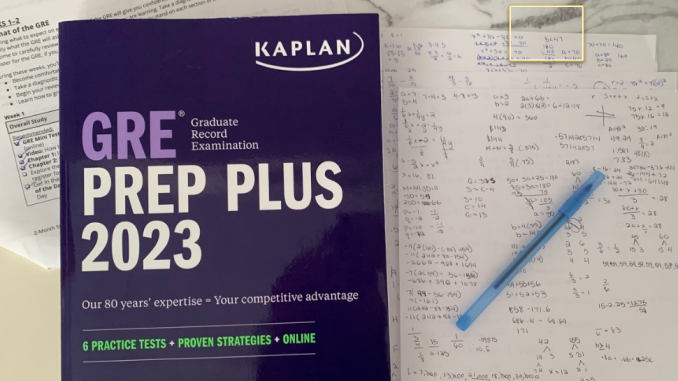
By Michela Arlia
130-170. Those are the magic numbers to score on the graduate record examination, also known as the bane of my existence for the last two months of my life. It occurred to me that most people have never heard of the GRE, yet simultaneously, I have never not heard of it. The GRE is another standardized test to measure basic skills on a difficult level, only adding to the stressors that the application season naturally brings.
While applying to graduate schools, I crossed my fingers, toes, and eyes that the exemption of the GRE scores due to the pandemic would extend one more year, but I was one unlucky camper. I knew I had to crack down leading up to the exam, and bought a test prep book thicker than a Miriam Webster. I worked on it daily, completing problem after problem, being as confused with words I have never heard in my life. My intention was to take this exam once and only once.
Growing up, I highly disagreed with standardized tests and all they stand for. A product of the public school system, from elementary through high school, I took state tests, regents, and even the SAT, but still to this day never felt it helped me in any way.
Throughout my process of attending open houses for programs over the past year, I had a program director say to me, “tell me your annual income and I’ll tell you your GRE score.” And that has been the best summarization of standardized tests if I’ve ever heard one.
Now let’s talk about how much these tests measure. The answer – nada.
These examinations have never seemed fair, as we begin in the younger grades with school becoming a job of teaching to align with a test instead of a solid knowledge base. It creates pressures and anxieties in young children that can then manifest into bigger problems as we grow up. The funniest part about these tests is that New York is one of two states that still administers state exams and regents, so the scores will never translate to anything in other states as there is no equivalent. As students, we have learned to obsess over these scores, allowing them to define us.
Applying to undergrad was a hassle in itself with the SAT, as my classmates would take the exam multiple times and pour themselves over test prep, but there’s a secret to all of this.
Something that people don’t realize, especially with the GRE, is that the test is designed as a game. An impossible game at that, where one of the hardest things to do is to take it twice and get a higher score the second time.
If anything, these exams for college admission exist for the sole purpose of test prep moguls like Kaplan and Princeton Review to gain a few extra bucks, and testing agencies such as Collegeboard and ETS to collect from desperate students wishing to put their best foot forward to land their dream schools.
If it’s one thing I’ve learned from going through my second round of major applications to higher education, it’s that no one cares as much as you think they do. The process itself is synonymous with chance and gambling, for no set of personal standards can guarantee admission.
By all means, this is not an argument for purposely flunking these exams, but at the same time, hopefully it is serving as a reminder that the test isn’t everything. Let your true self shine in application aspects like your personal statements and letters of recommendations (pick people you trust)!
There will be people who will read this and will think I’m hypocritical or say “I told you so.” I apologize to those people now. I am still learning, and my realization is better late than never.
Am I happy with my scores? No, not really. But will I be taking this again, putting myself through the agony? Also no. I’ve accepted that it is what it is, and I hope that the admissions gods are on my side this winter.
